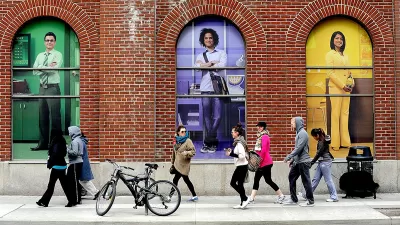Who should be required to take the first step in suburban retrofitting? The city, in the form of providing walkable, bikeable streets, or developers, by conforming to pedestrian-oriented building standards?
"A proposed Trader Joe's in Boulder, Colorado, brought up an interesting question this week in a spirited exchange on the Pro-Urb urban issues listserv: In auto-centric places where streets and infrastructure lack any sense of meaningful pedestrian amenity, who should take the lead on turning things around?"
"That is, should developers be required to build urban, pedestrian-oriented buildings fronting streets that are currently engineered as high speed arterials, in the hopes that, over time, a critical mass of new urban construction will foster the political will necessary to overhaul the infrastructure in further service of pedestrians and bicyclists? Or should the infrastructure be required to change first before any demands are placed on the private sector?"
Scott Doyon goes on to work through both sides of the debate, and asks readers to weigh in.
Thanks to Hazel Borys
FULL STORY: Chicken or the Egg: Who takes the lead on incremental suburban retrofitting?

Planetizen Federal Action Tracker
A weekly monitor of how Trump’s orders and actions are impacting planners and planning in America.

Restaurant Patios Were a Pandemic Win — Why Were They so Hard to Keep?
Social distancing requirements and changes in travel patterns prompted cities to pilot new uses for street and sidewalk space. Then it got complicated.

Map: Where Senate Republicans Want to Sell Your Public Lands
For public land advocates, the Senate Republicans’ proposal to sell millions of acres of public land in the West is “the biggest fight of their careers.”

Orange County, Florida Adopts Largest US “Sprawl Repair” Code
The ‘Orange Code’ seeks to rectify decades of sprawl-inducing, car-oriented development.

Maui's Vacation Rental Debate Turns Ugly
Verbal attacks, misinformation campaigns and fistfights plague a high-stakes debate to convert thousands of vacation rentals into long-term housing.

San Francisco Suspends Traffic Calming Amidst Record Deaths
Citing “a challenging fiscal landscape,” the city will cease the program on the heels of 42 traffic deaths, including 24 pedestrians.
Urban Design for Planners 1: Software Tools
This six-course series explores essential urban design concepts using open source software and equips planners with the tools they need to participate fully in the urban design process.
Planning for Universal Design
Learn the tools for implementing Universal Design in planning regulations.
Heyer Gruel & Associates PA
JM Goldson LLC
Custer County Colorado
City of Camden Redevelopment Agency
City of Astoria
Transportation Research & Education Center (TREC) at Portland State University
Camden Redevelopment Agency
City of Claremont
Municipality of Princeton (NJ)




























